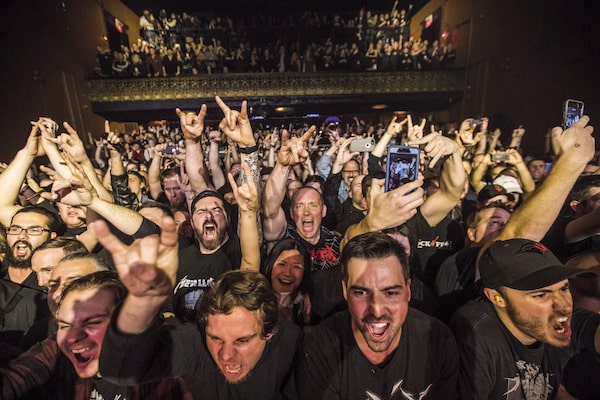
A new study finds that the live music industry was plagued by more venue closings than openings, even before the COVID-19 pandemic.Mark Blinch/The Canadian Press
Innovate or die, say the authors of a new study, Reimagining Music Venues.
The report, released Thursday, offers measured optimism on Ontario’s live music industry while suggesting entrepreneurial flair and a focus on grassroots culture spaces is the key to the sector’s sustainability.
“We are in a moment where we see a fair bit of dysfunctionality,” report co-author Dan Silver said in an interview. “That’s a problem, but there’s also a big appetite for experimentation.”
Silver is a sociology professor at University of Toronto Scarborough and co-lead of the Creative Communities Commons at U of T’s School of Cities. He produced the report with Jonathan Bunce, artistic director of the Toronto non-profit organization and concert series Wavelength Music.
The co-authors spoke to The Globe and Mail about what they see as a flawed live music market where performers believe they’re underpaid, audiences think they’re paying too much for tickets, and promoters and venue operators are facing rising costs and pandemic-related cutbacks to their government grants.
“The next few years look scary economically for the sector,” said Bunce, who under his pen name Jonny Dovercourt wrote the book Any Night of the Week: A D.I.Y. History of Toronto Music 1957-2001.
According to the study, even before the COVID-19 pandemic, the industry was plagued by more venue closings than openings. When the live-performance restrictions were applied, the problematic issues were exacerbated, resulting in a 13-per-cent closing rate for small venues surveyed in Toronto.
Particularly hard hit were the more casual venues – described in the report as “chill” and “fun” places. Venues categorized as “nice,” usually larger facilities such as amphitheatres and soft-seat theatres, are faring much better.
Bar venues, long a staple of the live music industry, are suffering. According to a 2020 report (Re:Venues: A Case and Path Forward for Toronto’s Live Music Industry, prepared for the Canadian Live Music Association), more than half of local venues’ income came from drink sales – by far the largest source. Recent studies, however, show that young people do not drink as much alcohol as previous generations.
The new-found sobriety hurts an industry traditionally fuelled by the bottle.
“I don’t think the bar model will disappear,” Silver said. “But the time is ripe for opening up different models and letting people try different things.”
The study released Thursday includes suggestions for new models, such as mobile “stage truck” stages – basically a food truck for live music and DJs that eliminates many of the costs associated with traditional venues, while lessening the downtown concentration of music events.
Other recommendations include more multidisciplinary partnerships (sharing space with other arts groups or even craft breweries) and new funding and philanthropic systems.
This week, Live Nation Entertainment, North America’s leading concert promoter, launched a new program to support developing artists and crews. All Live Nation clubs will provide $1,500 in gas and travel cash per show to headliners and support acts, on top of nightly performance compensation. Additionally, the clubs will forgo merchandise-selling fees, allowing artists to keep 100 per cent of merchandise profits.
However, the initiative applies to just seven venues in Canada: Edmonton’s Midway Music Hall; Vancouver’s Commodore Ballroom; Kee to Bala, in Bala, Ont.; and Toronto’s History, Danforth Music Hall, Opera House and Velvet Underground. Moreover, the program is scheduled to run only to the end of the year.
Laudable as it is, the Live Nation scheme is a temporary, Band-Aid solution. The new study argues instead for fresh models, not subsidies from a colossal concert promoter. Or from the government.
“There are so many reasons to be pessimistic, but I would encourage people within the music community not to complain about what your city is or isn’t doing,” Bunce said. “The government isn’t going to do it for us. Innovation must come from within.”
 Brad Wheeler
Brad Wheeler